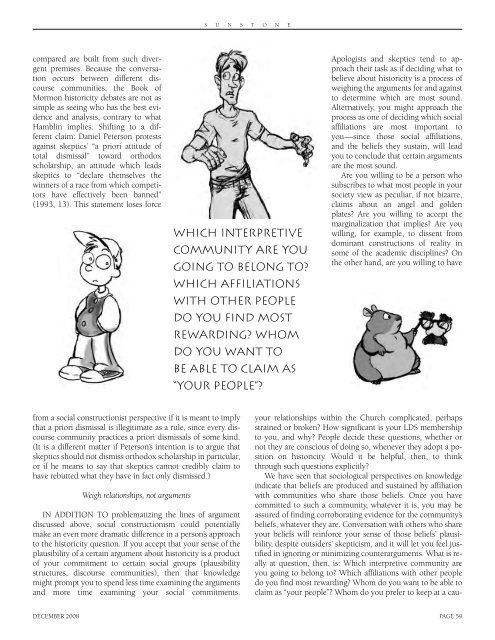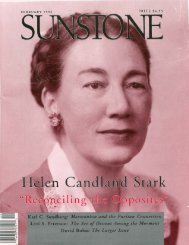Download Entire Issue PDF - Sunstone Magazine
Download Entire Issue PDF - Sunstone Magazine
Download Entire Issue PDF - Sunstone Magazine
Create successful ePaper yourself
Turn your PDF publications into a flip-book with our unique Google optimized e-Paper software.
S U N S T O N E<br />
compared are built from such divergent<br />
premises. Because the conversation<br />
occurs between different discourse<br />
communities, the Book of<br />
Mormon historicity debates are not as<br />
simple as seeing who has the best evidence<br />
and analysis, contrary to what<br />
Hamblin implies. Shifting to a different<br />
claim: Daniel Peterson protests<br />
against skeptics’ “a priori attitude of<br />
total dismissal” toward orthodox<br />
scholarship, an attitude which leads<br />
skeptics to “declare themselves the<br />
winners of a race from which competitors<br />
have effectively been banned”<br />
(1993, 13). This statement loses force<br />
Which interpretive<br />
community are you<br />
going to belong to?<br />
Which affiliations<br />
with other people<br />
do you find most<br />
rewarding? Whom<br />
do you want to<br />
be able to claim as<br />
“your people”?<br />
Apologists and skeptics tend to approach<br />
their task as if deciding what to<br />
believe about historicity is a process of<br />
weighing the arguments for and against<br />
to determine which are most sound.<br />
Alternatively, you might approach the<br />
process as one of deciding which social<br />
affiliations are most important to<br />
you—since those social affiliations,<br />
and the beliefs they sustain, will lead<br />
you to conclude that certain arguments<br />
are the most sound.<br />
Are you willing to be a person who<br />
subscribes to what most people in your<br />
society view as peculiar, if not bizarre,<br />
claims about an angel and golden<br />
plates? Are you willing to accept the<br />
marginalization that implies? Are you<br />
willing, for example, to dissent from<br />
dominant constructions of reality in<br />
some of the academic disciplines? On<br />
the other hand, are you willing to have<br />
from a social constructionist perspective if it is meant to imply<br />
that a priori dismissal is illegitimate as a rule, since every discourse<br />
community practices a priori dismissals of some kind.<br />
(It is a different matter if Peterson’s intention is to argue that<br />
skeptics should not dismiss orthodox scholarship in particular,<br />
or if he means to say that skeptics cannot credibly claim to<br />
have rebutted what they have in fact only dismissed.)<br />
Weigh relationships, not arguments<br />
IN ADDITION TO problematizing the lines of argument<br />
discussed above, social constructionism could potentially<br />
make an even more dramatic difference in a person’s approach<br />
to the historicity question. If you accept that your sense of the<br />
plausibility of a certain argument about historicity is a product<br />
of your commitment to certain social groups (plausibility<br />
structures, discourse communities), then that knowledge<br />
might prompt you to spend less time examining the arguments<br />
and more time examining your social commitments.<br />
your relationships within the Church complicated, perhaps<br />
strained or broken? How significant is your LDS membership<br />
to you, and why? People decide these questions, whether or<br />
not they are conscious of doing so, whenever they adopt a position<br />
on historicity. Would it be helpful, then, to think<br />
through such questions explicitly?<br />
We have seen that sociological perspectives on knowledge<br />
indicate that beliefs are produced and sustained by affiliation<br />
with communities who share those beliefs. Once you have<br />
committed to such a community, whatever it is, you may be<br />
assured of finding corroborating evidence for the community’s<br />
beliefs, whatever they are. Conversation with others who share<br />
your beliefs will reinforce your sense of those beliefs’ plausibility,<br />
despite outsiders’ skepticism, and it will let you feel justified<br />
in ignoring or minimizing counterarguments. What is really<br />
at question, then, is: Which interpretive community are<br />
you going to belong to? Which affiliations with other people<br />
do you find most rewarding? Whom do you want to be able to<br />
claim as “your people”? Whom do you prefer to keep at a cau-<br />
DECEMBER 2008 PAGE 59

















